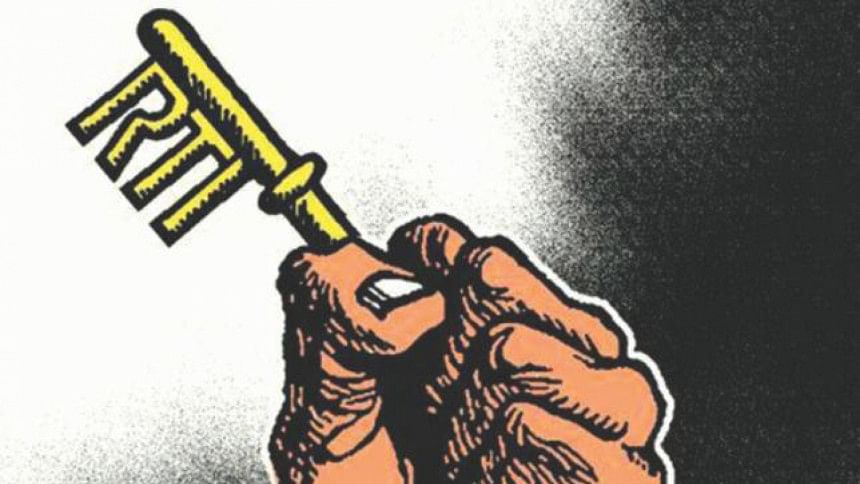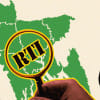Stop-and-go: Use of RTI in Bangladesh

International observers who follow global trends on the progress of transparency and accountability instruments, such as Right to Information (RTI) or Freedom of Information (FOI), which have witnessed phenomenal growth in the last three decades, are often asked if the laws have fared well in their new abodes with varying levels of democratisation.
One way of observing the progress of the law in any country is to assess existing trends and the nature of its use.
The decisions of the Information Commission (IC) are a good indicator of the state of RTI in Bangladesh. A random selection of all the IC decisions made in 2018 provides a flavour of the types of RTI requests made by citizens and the authorities to whom they are made. They also indicate how receptive—or not—the authorities are to citizens' requests for information.
The decisions also serve as a yardstick to assess the approach of the IC in dealing with issues raised in the complaints, as well as how it applies the provisions and objectives of the law.
A quick glance at the decisions show that the majority of RTI users in the country continue to see the law primarily as an instrument to obtain information for personal needs or to unearth the wrong-doings of public authorities. In other words, their main focus is on the transparency and accountability objectives of the law.
That the law has many other uses beyond these objectives appears to be lost on our citizens. These are only the tip of the iceberg. Underneath it lies a whole range of functions which include extending the knowledge base of citizens on important national issues and developing closer interaction between citizens and the government. They may or may not be directly related to transparency and accountability but are nevertheless very important objectives.
We shall cite only three decisions here. Readers may wish to look up their fuller versions and other decisions from the IC at the commission's website.
In decision number 08/2018, the applicant asked the Designated Officer (DO) of Bangladesh Livestock Research Institute for information relating to the appointment of a Procurement Officer for the institute. He sought copies of the advertisement for the post, where and when it was published, photocopies of exam papers of candidates and other relevant documents.
Not receiving a response from him, the applicant appealed to the Appellate authority of the institute, following which the DO asked him to reapply, since the font of his email application was apparently broken in transmission. The applicant refused this argument and complained to the IC for relief.
After listening to the arguments of both sides, the IC simply directed the institute to provide the information sought by the complainant minus the photocopies of the papers of all examinees. These could not be provided as the applicant himself was not an examinee, and had no right to see the written papers of other examinees, which are their intellectual property.
In decision number 09/2018, the applicant asked the Office of the Divisional Customs and Bond Commissionerate, Savar, Dhaka, for various information dating as far back as ten years, which included the number of vehicles seized for illegal transportation of goods from the premises of various authorities, the names of the owners of the vehicles, particulars of the vehicles and the dates of their seizure. He also wanted to know where the seized vehicles were kept, whether cases were filed in accordance with Customs rules, whether the vehicles were released after payment of fines, the amount levied and the section of the law under which they were released.
Not receiving a response, the applicant appealed to the appellate authority of the institution, which too did not respond. He, therefore, complained to the IC which summoned the parties to a complaint hearing.
At the hearing, the DO of the Commissionerate claimed that he was new to the post and discovered only recently that his office began recording information, as required under RTI regulations, only four years ago. As such, he would be able to provide the information for those four years only. Based on this assurance, the IC directed him to do so accordingly, overlooking the penalty prescribed by the law for non-response to RTI requests in time.
This is another proof that in the overwhelming number of complaints filed with the IC, where DOs agree to provide the requested information only at the hearing, they go away unpenalised for not doing so in time. The prevalence of this practice since the beginning appears to have emboldened institutions to disregard RTI requests unless compelled to do so.
In decision number 20/2018, the applicant requested the Headmaster of a Government High School to provide the annual statement of income and expenditure of the school for years ranging from 2012 to 2017; list of students admitted for 2016-17 school year; vouchers for all expenses incurred in 2016-17, and the list of all teachers of the school.
As usual, not receiving a response within the stipulated period, the applicant appealed to the appellate authority which too did not respond. So, he complained to the IC.
At the complaint hearing, the headmaster stated that the accounts of the school were regularly audited by the appropriate government authority and he had no problem to share them with the applicant. But the applicant, who is a local journalist, is known for abusing his background to extort money from different sources. He was nevertheless called over the phone and asked to deposit the required government fees to obtain the information and come personally to fetch them. As he failed to do so, the information could not be provided.
The Commission took the position that as the headmaster was unable to produce a copy of his letter asking the applicant to deposit the required government fees and as the right place for dealing with his allegations against the complainant was the court of law, he should respect the right of the applicant to seek and obtain the requested information, except for the list of students, which may affect their personal security.
The three examples reveal the general tendency of the authorities to disregard RTI requests till forced to do so at the complaint hearings. It is, however, unclear if the information is made available even after the IC's directives. The IC may wish to look it up and develop an effective follow-up mechanism.
The third case also demonstrated a non-partisan position taken by the IC in the face of conflicting claims. Its position in favour of the applicant belied its earlier reputation of being more deferential towards public officials than ordinary citizens. The continuation of such a trend will enhance the prestige and credibility of the IC.
Citizens must, however, also realise that there are greater uses of the law than simply to seek transparency and accountability in the work of public offices. If the latter remains the main focus, and naming and shaming of public officials is seen by the latter as the key motive for RTI users, progress is bound to be adversely affected. Citizens' fear of retributory action by public officials faced with probing RTI requests and the latter's perception that the law is primarily used to harass them is not healthy for the system. We must come out of this quagmire.
It is time, therefore, that citizens are made aware of the broader scope of the law and its application. On our part, we have tried to do so through our columns in this newspaper, in particular the one published on November 15, 2018 under the title: "The many uses of RTI: Our imagination is the limit." We invite others to reflect on the matter.
Shamsul Bari and Ruhi Naz are Chairman and RTI Coordinator respectively at Research Initiatives, Bangladesh (RIB). Email: [email protected]










Comments